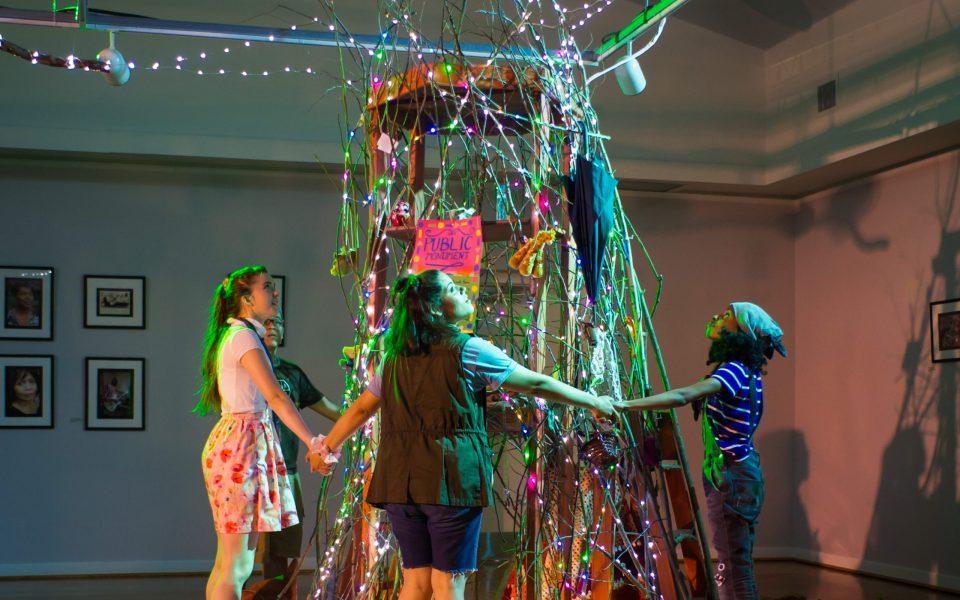Lithe branches floated over the heads of The Sky Game’s audience as the children’s faces beamed with wonder. The play’s main characters, too, gazed upward toward the sound of wind chimes, hearts soaring in harmony with ethereal soundscapes as they visited their imagined “Level of the Clouds” on June 23.
More than 30 people sat atop a semicircle of folding risers — an imagined grassy hillside — and overlooked a magical tree at the edge of an elite public school’s property as they learned about The Sky Game’s four levels: the Roots, the Bark, the Leaves and the Clouds.
Each level bears a lesson, reflecting layers of the increasingly tumultuous inner worlds of four neighborhood misfits — Mari, Lola, Banjo and Jane — as they attempt to navigate their changing environment in eastern Winston-Salem. Jane’s upper-class family moves in as gentrification pushes Lola’s family out; Banjo dreams of the safety and comfort of large lake houses while Mari focuses on the sanctuary of the newly discovered tree, where they’ve been playing all summer.
Two visiting University of Texas at Austin MFA candidates, Hannah Wolf and Kimberly Belflower, directed and penned the play aimed at children for Kaleideum’s Peppercorn Theatre. The theater is currently in residence at the Delta Arts Center, an art gallery and cultural center located on New Walkertown Road.
Equally endearing and grating, the actors’ explosive energy brought the bare-bones production to life. They persuasively embodied the emotional landscapes of elementary-age children grappling with motifs of betrayal, memory, empathy and vulnerability.
Whether the play acknowledged or reinforced racial and gender stereotypes – such as Lola’s portrayal as the “angry black girl”– will fall in the eyes of the beholder, but the show did shine a light on emotional violence rooted in privilege. (“You don’t look like the kind of kid who would read the grown-up version of Jane Eyre,” Jane said to Mari.) It is just as much a play about creativity and navigating friendships as it is about economic displacement in a hyperlocal context.
At its core, The Sky Game works because of its participatory nature. By the end of the show, actors referred to audience members as fellow “ground enforcers,” those who help protect the magical tree, and asked them to leave messages for future ground enforcers on their “trophy” objects chosen upon arrival.
In a particularly moving scene, the four misfits declare they will harness the transformative power of their stories to resist the forces that seek to destroy the tree. Upon divulging their most cherished secrets, Mari and her friends reveal the inherent power of vulnerability and, to the children’s delight, attendees amplified that power when invited to place their objects on the tree as well. Many lingered, in awe, to cradle trophies central to the plot. Parents, too, enjoyed the production.[pullquote]The Sky Game shows through July 2. Learn more at peppercorntheatre.org.[/pullquote]
“I thought the set was beautiful, did a lot with a little and brought the world to life,” said Beth Harper of Winston-Salem.
Harper brought her sons Miles, 4, and Charlie, 7, to the June 23 afternoon showing. All three recommend the play.
“From my perspective, I liked the message of the story,” Harper said. “For my kids, I liked that they could both come. It was interactive; it was easy for them to watch and appreciate. They were eager to participate and it was kid-friendly and accessible for a lot of different ages.”
Excited to see an event catered to younger children, Dianne Caesar brought her granddaughter, Rozzi, to the show.
“I thought the actors were very good,” said Caesar, previously the decade-long executive director of the arts center. “There were some stereotypes in it… but I’m sure I’m looking at it at a different level. The kids, it held their attention and they enjoyed it.”
Despite the actors’ passion, the attention of younger children tended to fade in and out. Caesar noted that 4-year-old Rozzi became restless by the end of the hour-long production, and recommends the play for ages 6 and older.
That said, Miles, also 4, took a message from the play. “It’s like… you have the power!” he said.
Thematic elements tying individual and collective power to the ability to exact change will strike a chord for those invested in community and movement-building work.
As Mari imparts, “Some things are worth trouble.”
Join the First Amendment Society, a membership that goes directly to funding TCB‘s newsroom.
We believe that reporting can save the world.
The TCB First Amendment Society recognizes the vital role of a free, unfettered press with a bundling of local experiences designed to build community, and unique engagements with our newsroom that will help you understand, and shape, local journalism’s critical role in uplifting the people in our cities.
All revenue goes directly into the newsroom as reporters’ salaries and freelance commissions.


Leave a Reply